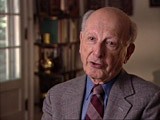You searched for: %E5%85%B1%E4%BA%AB%E6%A4%85%E7%90%86%E8%B4%A2%E7%B3%BB%E7%BB%9F%E6%BA%90%E7%A0%81%E5%BF%AB%E9%80%9F%E6%90%AD%E5%BB%BA%E3%80%90TG%EF%BF%BD%EF%BF%BD%EF%BF%BD%EF%BF%BD%EF%BF%BD%EF%BF%BD%EF%BF%BD%EF%BF%BD%EF%BF%BD%40EK7676%E3%80%91%E5%B9%B3%E5%8F%B0%E5%8C%85%E7%BD%91%E6%90%AD%E5%BB%BA%E5%85%B1%E4%BA%AB%E6%A4%85%E7%90%86%E8%B4%A2%E7%B3%BB%E7%BB%9F%E6%BA%90%E7%A0%81%E5%BF%AB%E9%80%9F%E6%90%AD%E5%BB%BA%E3%80%90TG%EF%BF%BD%EF%BF%BD%EF%BF%BD%EF%BF%BD%EF%BF%BD%EF%BF%BD%EF%BF%BD%EF%BF%BD%EF%BF%BD%40EK7676%E3%80%91%E5%B9%B3%E5%8F%B0%E5%8C%85%E7%BD%91%E6%90%AD%E5%BB%BApdAYDbTOVc
<< Previous | Displaying results 151-160 of 208 for "%E5%85%B1%E4%BA%AB%E6%A4%85%E7%90%86%E8%B4%A2%E7%B3%BB%E7%BB%9F%E6%BA%90%E7%A0%81%E5%BF%AB%E9%80%9F%E6%90%AD%E5%BB%BA%E3%80%90TG%EF%BF%BD%EF%BF%BD%EF%BF%BD%EF%BF%BD%EF%BF%BD%EF%BF%BD%EF%BF%BD%EF%BF%BD%EF%BF%BD%40EK7676%E3%80%91%E5%B9%B3%E5%8F%B0%E5%8C%85%E7%BD%91%E6%90%AD%E5%BB%BA%E5%85%B1%E4%BA%AB%E6%A4%85%E7%90%86%E8%B4%A2%E7%B3%BB%E7%BB%9F%E6%BA%90%E7%A0%81%E5%BF%AB%E9%80%9F%E6%90%AD%E5%BB%BA%E3%80%90TG%EF%BF%BD%EF%BF%BD%EF%BF%BD%EF%BF%BD%EF%BF%BD%EF%BF%BD%EF%BF%BD%EF%BF%BD%EF%BF%BD%40EK7676%E3%80%91%E5%B9%B3%E5%8F%B0%E5%8C%85%E7%BD%91%E6%90%AD%E5%BB%BApdAYDbTOVc" | Next >>
-
The Holocaust in Odesa
ArticleIn October 1941, Romania, an ally of Nazi Germany, perpetrated mass killings of Jews in Odesa. Learn more about the Holocaust in Odesa and Ukraine.
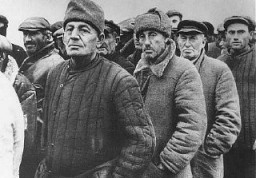
-
Wilek (William) Loew describes forced labor in Lvov
Oral HistoryWilek was the son of Jewish parents living in the southeastern Polish town of Lvov. His family owned and operated a winery that had been in family hands since 1870. Wilek's father died of a heart attack in 1929. Wilek entered secondary school in 1939. Soon after he began school, World War II began with the German invasion of Poland. Lvov was in the part of eastern Poland annexed by the Soviet Union. Although the Soviets took over Wilek's home and the family business, Wilek was able to continue his…
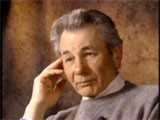
-
Hajj Amin al-Husayni: Arab Nationalist and Muslim Leader
ArticleHajj Amin al-Husayni claimed to speak for the Arab nation and the Muslim world and sought an alliance with the Axis powers during WWII. Learn more about his actions
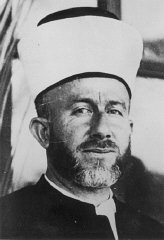
-
Hodonín U Kunštátu (Hodonín bei Kunstadt) (Roma camp)
ArticleIn March 1942, the Hodonin camp was classified as a camp for Roma. It was a transfer station during deportation to Auschwitz-Birkenau. Learn about the camp and its history.
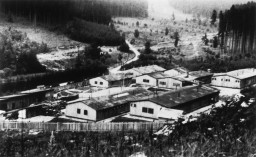
-
Tuvia Bielski
ArticleRead the Jewish Partisan Educational Foundation's short biography of Tuvia Bielski.
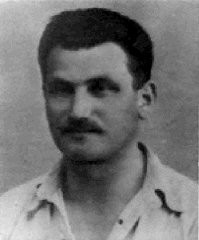
-
Szlamach Radoszynski
ID CardSzlamach was one of six children born to Yiddish-speaking, religious Jewish parents. Szlamach's father was a peddler, and the Radoszynski family lived in a modest apartment in Warsaw's Praga section on the east bank of the Vistula River. After completing his schooling at the age of 16, Szlamach apprenticed to become a furrier. 1933-39: During the 1930s Szlamach owned a fur business. Despite the Depression, he was hoping the economy would turn around so that he could make enough money to move into his own…
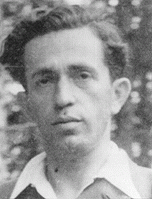
-
Isachar Herszenhorn (Irving Horn)
ID CardIsachar was born to a Jewish family in the Polish city of Radom, approximately 75 miles south of Warsaw. The city was the center of Poland's leather-tanning industry. Isachar's father worked as a salesman for a nearby tanning factory. His father was a successful salesman and the family lived comfortably. 1933-39: During registration for Isachar's first-grade class in 1934, a Jewish boy was pushed down the stairs. When his mother confronted the principal about the incident, all he said was that the boy had…
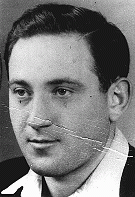
-
Laura Litwak
ID CardLaura was the second of five children born to religious Jewish parents in the industrial city of Lvov. She was often called affectionately by her nickname, Lorka. Coming from an educated family living in a multi-ethnic part of Poland, she grew up speaking Polish, Russian, German and Yiddish. As a young woman, she earned a humanities degree from St. Nicholas University in Lvov. 1933-39: In April 1935 Laura became Mrs. Daniel Schwarzwald. Her husband was a successful lumber exporter, and they lived in a…
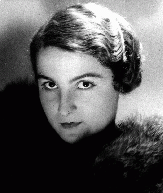
-
War Refugee Board: Background and Establishment
ArticleIn January 1944, FDR established the War Refugee Board which was charged with “immediate rescue and relief of the Jews of Europe and other victims of enemy persecution.”
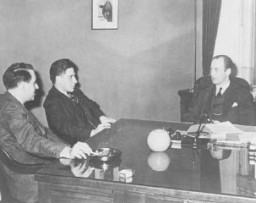
-
Alexander Schenker describes working as a lumberjack in a labor camp in Siberia
Oral HistoryFollowing the German invasion of Poland in September 1939, Alexander and his family fled eastward to Lvov. His father then fled to Vilna, hoping to obtain visas for the family to escape through Japan. The rest of the family was caught while trying to cross border into Lithuania in order to meet up with Alexander's father. They returned to Lvov. Alexander and his mother were later arrested for refusing to declare Soviet citizenship. They were sent to a labor camp in the Soviet interior. After their release…
